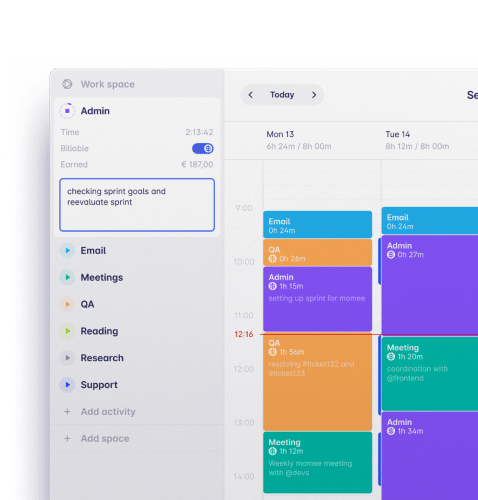How to Make Time Go Faster at Work: 11 Pro Tips
Time. It flies when you’re having fun but drags on endlessly when you least need it. Sometimes it seems as if the workday will never end. We keep looking at the clock, and mere seconds have passed. It all gets worse when something exciting awaits us after work – the hours just don’t fly by.
If only there were a way to speed up time at work. What if we told you there is? Well, unfortunately, we still can’t manipulate the passage of time, but we can help you change your perception of it.

Free eBook: Reclaim control of your time
Get your free copy and discover how to leverage the power of time tracking in your team.
So, if you’re looking for tips to make time go by faster at work, you’re in the right place. By applying some of our tips, the hours at work will fly by, and you’ll quickly be free to enjoy yourself after you’re done for the day.
We’ll also explain why time passes so slowly when you’re working.
Top tips to make time go faster at work
11 tips on how to make time go faster:
- Invest in task management techniques
- Track your time
- Stop looking at your watch
- Practice deep work
- Create a routine
- Try time blocking
- Prioritize meaningful work
- Offer a helping hand
- Change your scenery
- Turn on “do not disturb”
- Continuously renew knowledge
1. Invest in task management techniques
One great trick to make the clock speed up while you work is organizing your day so there are no dead moments. Following a flow keeps us stimulated. To achieve that, you’ll have to plan your day efficiently.
Next, we will teach you two tricks that will certainly help you.
Do you want to know the best time management techniques? Pick one and improve your productivity.
2. Track your time
Using a time tracker can make time seem faster because it shows how much time has passed, making us feel like we’re making progress and creating a sense of urgency that makes time appear to speed up.

Looking for the time tracker that you will actually enjoy?
3. Stop looking at your watch
By now, you already know that looking at the clock isn’t helping. Our perception of time is subjective; the more you focus on it, the more granular it will seem.
Then, there’s chronostasis. Chronostasis is a phenomenon that happens when you suddenly look at an analog clock, and it seems that, for a second, the second arrow doesn’t move.
Did you catch the clock in a moment of laziness that only you noticed? No, actually, science explains chronostasis as an attempt by the brain to compensate for a very fast eye movement – when we should stop seeing for a split second – with a story.
The rapid eye movement creates an information break, which is “hidden” with the illusion that the clock is not moving.
So instead of looking at the clock every 5 minutes and always ending up disappointed, don’t. Keep reading, find other ways to entertain yourself, and time will have flown by before you know it!
4. Practice deep work
To better understand the meaning of deep work, it’s easier to look at its opposite first.
People nowadays spend most of the day distracted, trying to multi-task while answering emails, taking calls, and responding to a thousand requests in the company chat room. Multitasking decreases your productivity and it leads to This results in unmeaningful, exhausting, and unproductive work.

Track time dedicated to deep work with an intuitive time tracking app
Deep work is the exact opposite. It requires focus, concentration on one task, and no distractions. This is where you get the best productivity, quality, and creativity results. And this is also how time passes faster.
Some call it being in the zone. Whatever you call it, deep work is the way to get to the end of the workday faster – and best of all, with all your work done!
Did you know that multitasking is one of the reasons why several professionals feel unproductive? Get to know other reasons that can explain this feeling.
5. Create a routine
Do you remember the route to work that you take every day? Hardly at all, right? This is because routines are so predictable and repeated daily that you completely forget they exist.
By establishing a routine, your brain will “switch off” and do those tasks automatically, without you realizing how much time is passing. This may not be the best way to increase productivity or find fulfillment at work, but it will help the time go by faster.

6. Try time blocking
One of the best ways to achieve the deep work we just mentioned is time blocking.
Time blocking consists of blocking off periods of time in your calendar to work on certain tasks. During that time, nothing should interrupt you.
Each individual should create blocks according to his or her tasks and ability to concentrate. We advise you to try the Pomodoro Time Management Technique (25-minute work sessions alternated by 5-minute breaks). If it doesn’t work for you, then we advise you to read our post about the best Pomodoro alternatives.
7. Prioritize meaningful work
Nobody likes the feeling of doing something that has no impact on their team or customers.
Engagement falls off when you’re doing something unmeaningful to you at work. And you know what happens when you’re disengaged: boredom sets in, and you start dragging your feet, looking at your watch more often, and, of course, feeling that time takes forever to pass.
To avoid reaching the end of the day completely drained, try to organize your day or week in a way that prioritizes the impactful work.
Of course, you can’t always get away from tasks you hate – there is no such thing as the perfect job. So, our tip is to invest in the work that stimulates you most in the periods when your creativity is flowing (for many, it’s the morning period). That way, you leave the tasks that don’t demand much of your intellect for when you’re naturally less productive.

8. Offer a helping hand
If nothing in your work inspires you and it’s getting painful, why not offer to help a colleague with something that’s overwhelming them?
Even if the work itself is not enjoyable, the feeling of helping someone will give you a purpose and a sense of mission. On the days when time seems to stand still and the afternoon is 10 hours long, try asking your team if you can help with something.

Track time of individual tasks to discover how long you really work
“The data acts as a review of how productive the day has been, and helps validate why I’m feeling tired when I look back and see the amount of hours clocked that week. Then I know it’s time to book a trip!”
9. Change your scenery
Sometimes routine is our friend. Sometimes it is our enemy. Nowadays, we know that the place where we work influences our well-being and productivity. So we suggest first critically evaluating your work space and getting rid of all clutter and distractions.
Our second suggestion is that you change the scenery. Change is good, exciting, and stimulating. Try working from another room in the house, a coffee shop, a public library, or even outdoors.
All this, of course, if you have that work flexibility. You will find that these small changes in your daily work routine will make the day more exciting and make the hours go by faster.

10. Turn on “do not disturb”
Technology has brought us endless advantages. However, it has also brought one of the biggest challenges today: always being connected. “Check out this video Mary posted”, “Haven’t posted in a long time, share what you’ve been up to”.
Every day our phone is flooded with notifications like these, and even when it’s not, the temptation to pick up the phone and scroll through social media when we’re bored is great.
These distractions seem to help us accelerate our time at work. However, when we start watching repetitive content, we realize that it’s only been 10 minutes, and we still have the whole afternoon ahead of us. Frustration sets in.
We advised you to try your best to avoid these distractions and isolate yourself from technologies to achieve the deep work we’ve already discussed. Some tips on how to avoid time wasters:
- Put your phone and other devices on mute;
- Turn off all app and social media notifications;
- Turn the phone screen down or store it out of reach of your hands.
After all, while you’re working, most of your friends and family will be too. So don’t worry. Their vacation photos will still be there when you get back.
11. Continuously renew knowledge
Sometimes demotivation can be a result of a feeling of lack of novelty and knowledge to go further. Without knowledge renewal, your work will become less and less challenging and, therefore, more boring. In turn, the more bored we are, the slower time passes.
Therefore, you must make sure you don’t become stagnant. Find opportunities to grow and learn, whether it’s enrolling in a course, attending a conference, or a webinar. Who knows, you may even be promoted to a position where the speed at which time passes is no longer a concern.

Free eBook: Reclaim control of your time
Get your free copy and discover how to leverage the power of time tracking in your team.
Why does time pass so slowly at work?
The perception of time is very particular and variable. It can change with our emotional or physical state, engagement, and even events in our personal life.
Unfortunately, not everyone is working their dream job right now. With very rare exceptions, we’ve all worked at some point at something we don’t like.
And even if you are in the position you have always wanted, it’s impossible for you to like 100% of what you do.
This is normal, no problem admitting it! And it’s exactly in those moments that we feel that time stops. But why?
Usually, time passes more slowly at work because:
- You focus too much on the clock: if you’re always keeping an eye on it, you’re more likely to notice its slow progress. And the more aware you are that time passes slowly…, the slower it goes!
- You’re bored: Uninteresting meetings seem to last a lifetime, while a dinner with friends goes by in a flash. Vacations rush by, but the first week of work feels like three. You get our point, right? When something bores us, time seems to slow down.
- You feel disengaged: There are many reasons why employees feel disengaged. It may have to do with the nature of the work, your state of mind, or even because you don’t identify with the company’s values. Whatever the reason, this feeling of non-identification or lack of purpose can contribute to the feeling that time passes more slowly.
Conclusion
The truth is that there are no perfect jobs. So, at some point in your working life, you have felt like you would like to wave a magic wand and make time go faster. Unfortunately, that’s not yet possible.
Our perception of the passage of time depends on several factors, from our workload to our mental state and motivation. If you’re going through a difficult time when work doesn’t fly by, we hope this article has helped you.
And don’t forget tip number 1 and the most important of all – stay away from the clock! You’ll find that time will go by faster if you ignore it.
FAQ
In retail, there’s always something to do. Time flies when you distract yourself, so even if it means dusting or organizing for two hours, keep yourself distracted.
Call center work can be boring, but time passes faster when your performance improves. Concentrate on your goals and do your best to beat them by staying busy and focused on your job performance.

You might be interested in: